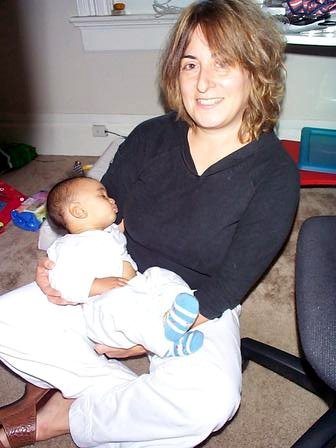I Left My Heart in San Francisco
The Internet boom ended. Laura and Kevin, here for 15 years, finally moved to Denver. Brian and Marci, Brookline. Mike and Diana, Boston. Melissa and Ian, Durango. Elise and Don, Portland. Cyndi and Greg and Mark and Julie, Boulder.
Laura and I moved here together after Tufts, after teaching English in Taipei. We first met when we were nineteen. In the Mission we lived on Fair Oaks Street with both of our ex-husbands. On Sunday mornings, Pasek used to walk to Martha's Coffee on 24th Street to bring home a latte and a scone for me, and then we'd rollerblade to Golden Gate Park, and from the park to the beach, my hands around his waist. I was no good at braking but I would never fall with him in front of me. I couldn't brake, but I was good at just going and going and going.
Laura and her husband Pete used to snuggle on their couch and call each other "Doh." Our marriages crumbled at the same time. We were still in our twenties. We went crazy together after divorce. She finally learned to come with an alcoholic but adoring new boyfriend; I drove to West Oakland to hear my crush practice singing dancehall in a warehouse. He was tall and fierce and had problems with crystal meth and anger management. I wanted to be with someone who was more troubled than I was, or who understood loss.
On New Year's Eve 2005, I was at Laura and Kevin's house in Oakland, near the Coliseum. We drank champagne and watched the ball drop as Turner and Gabriel played. Kevin let in a neighbor, a middle-aged woman with her bewildered-looking foster son. She asked us for a drink. She was full of stories. Laura just listened as she usually does. We had a happy New Year's. They made over $100,000 on their house, which used to be a crack house, and just bought a five-bedroom ranch house near Denver. Laura just emailed me and asked when we will come to visit.
I don't know, I think to myself. I don't know.
For now I am staying here.
Laura and I moved here together after Tufts, after teaching English in Taipei. We first met when we were nineteen. In the Mission we lived on Fair Oaks Street with both of our ex-husbands. On Sunday mornings, Pasek used to walk to Martha's Coffee on 24th Street to bring home a latte and a scone for me, and then we'd rollerblade to Golden Gate Park, and from the park to the beach, my hands around his waist. I was no good at braking but I would never fall with him in front of me. I couldn't brake, but I was good at just going and going and going.
Laura and her husband Pete used to snuggle on their couch and call each other "Doh." Our marriages crumbled at the same time. We were still in our twenties. We went crazy together after divorce. She finally learned to come with an alcoholic but adoring new boyfriend; I drove to West Oakland to hear my crush practice singing dancehall in a warehouse. He was tall and fierce and had problems with crystal meth and anger management. I wanted to be with someone who was more troubled than I was, or who understood loss.
On New Year's Eve 2005, I was at Laura and Kevin's house in Oakland, near the Coliseum. We drank champagne and watched the ball drop as Turner and Gabriel played. Kevin let in a neighbor, a middle-aged woman with her bewildered-looking foster son. She asked us for a drink. She was full of stories. Laura just listened as she usually does. We had a happy New Year's. They made over $100,000 on their house, which used to be a crack house, and just bought a five-bedroom ranch house near Denver. Laura just emailed me and asked when we will come to visit.
I don't know, I think to myself. I don't know.
For now I am staying here.

